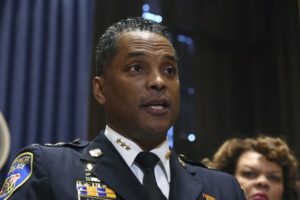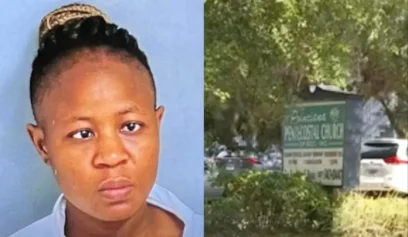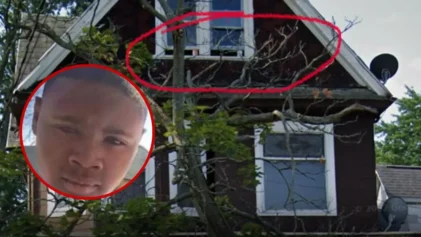
Darryl DeSousa, a 30-year veteran of the Baltimore Police Department, takes questions at City Hall after replacing Kevin Davis as police commissioner, in Baltimore. (Kim Hairston /The Baltimore Sun via AP, File)
BALTIMORE (AP) — Even in a city accustomed to rapid turnover with its police commissioners, Darryl De Sousa’s tenure as Baltimore’s top cop was brief. Within days of being charged by federal prosecutors with failure to pay his taxes, he resigned Tuesday after just 116 days on the job.
De Sousa was the third person to hold the post over the last three years and the ninth since 2000. His three federal misdemeanor charges are the latest embarrassment to rock the beleaguered Baltimore force, which has been reeling from scandal to scandal.
“Law enforcement needs to follow the law. It is critically important that the citizens of Baltimore have complete faith in their police department. I am deeply disappointed by Mr. De Sousa’s actions that leave us in this place,” City Councilman Zeke Cohen said.
De Sousa’s resignation was announced by Mayor Catherine Pugh, who said she accepted it. She picked him as the city’s commissioner in January, portraying the veteran Baltimore police commander as the right person to lead the force as the violent crime rate continued to soar. The City Council nearly unanimously authorized De Sousa in February.
“I want to reassure all Baltimoreans that this development in no way alters our strategic efforts to reduce crime by addressing its root causes in our most neglected neighborhoods,” said Pugh, who fired De Sousa’s predecessor, Kevin Davis, in January after roughly 2 ½ years on the job.
Baltimore’s mayor said she has started a national search to find his successor. In the meantime, the police force is being led by Deputy Commissioner Gary Tuggle. He was named as acting leader Friday.
De Sousa could not immediately be reached Tuesday and the police department’s communications team offered no immediate comment. His attorney, Steven Silverman, said he did not wish to comment.
But De Sousa’s twin brother, Jason, described his brother’s resignation as “a loss for Baltimore City.”
“This is not the end. He has a very bright future, he’s very talented. He’s an intellect and he’s a great leader,” he said, adding that his brother was taking care of his parents, who had Alzheimer’s, during the period when he didn’t file his taxes.
The U.S. Attorney’s office announced last week that De Sousa “willfully failed to file a federal return for tax years 2013, 2014, and 2015, despite having been a salaried employee of the Baltimore Police Department in each of those years.”
If the charges are proven, De Sousa faces up to one year in prison and a $25,000 fine for each of the three misdemeanor counts. He has not had his initial court appearance yet.
Shortly after De Sousa was charged by federal investigators last week, he issued a statement Thursday admitting his failure to file federal and state taxes for those three years, but portrayed it as an oversight. He said he filed his 2016 taxes and got an extension for 2017, and is now working with a “registered tax adviser.”
“While there is no excuse for my failure to fulfill my obligations as a citizen and public official, my only explanation is that I failed to sufficiently prioritize my personal affairs,” De Sousa said.
As pressure mounted on De Sousa and City Hall, his resignation appeared to be the only viable path for him as he faced charges in the ongoing case. Pugh initially said she had “full confidence” in De Sousa, but a day later appointed an interim leader.
Last week, Silverman said federal prosecutors didn’t give his client a chance to offer an explanation or to file late tax returns before they brought criminal charges against him. Silverman said De Sousa did not know about the investigation until after the charges were filed.
The U.S. Attorney’s office did not immediately comment on De Sousa’s resignation or the ongoing case. De Sousa’s case is being handled by the same federal prosecutors who recently prosecuted eight members of a rogue Baltimore police unit called the Gun Trace Task Force.
The city’s police union, which applauded De Sousa’s promotion earlier this year, said it was “anxious to put these events behind us” and hoped Pugh would find a suitable replacement fast. “Our members deserve consistency in their leadership,” said Gene Ryan, union president.
A leadership vacuum and yet another headline-making embarrassment couldn’t come at a worse time for Baltimore’s police force.
The mid-Atlantic city of some 615,000 inhabitants ended 2017 with 343 killings, bringing the annual homicide rate to its highest ever: roughly 56 killings per 100,000 people. In contrast, New York City had 290 homicides last year, its fewest on record in the modern era for the city of 8.5 million people.
The feverish rate of killings has largely cooled so far this year. Pugh has credited De Sousa’s strategies and on Tuesday said “a broad-based, grassroots approach — underpinned by the utilization of new crime-fighting technology — is working and will continue to be effective.”
Still, violent crime remains high and Baltimore only recently finished its first year under a federal consent decree process that requires sweeping police reforms. And the jarring exploits of the wildly corrupt Gun Trace Task Force, which included officers reselling looted narcotics and sticking GPS trackers on the cars of robbery targets, has seriously eroded confidence in the city’s sworn protectors.
“In a police department that has had the worst kinds of challenges and scandals, this is the last thing that the people of Baltimore and its police officers need,” David Harris, who researches police behavior as a professor at the University of Pittsburgh School of Law, said about the commissioner’s federal charges prior to his resignation.
___


